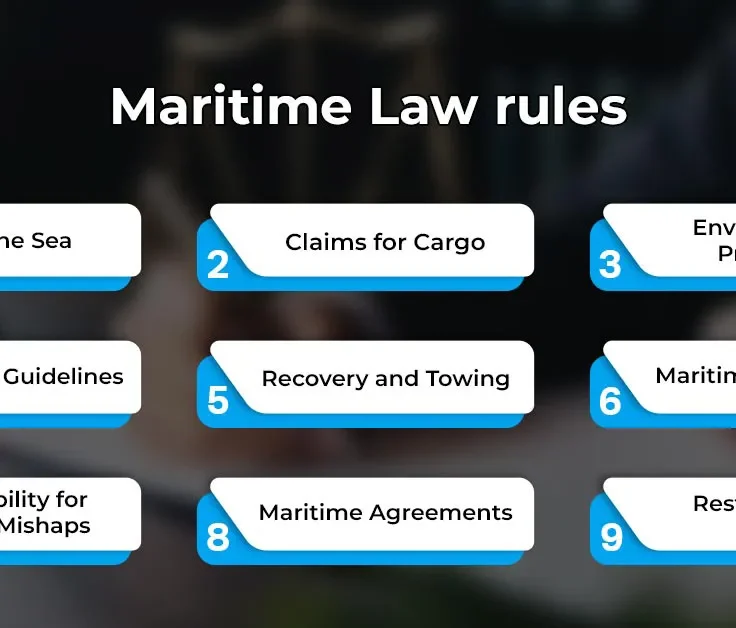Legal Considerations for Maritime Law and Cross-Border Taxes
Maritime law, often referred to as admiralty law, governs the activities, rights, and liabilities involved in shipping and navigation. Cross-border taxes, on the other hand, deal with taxation when goods or services are traded across international boundaries. When combined, these areas form a complex web of rules and obligations for those involved in global trade by sea. Understanding both maritime law and cross-border taxes is crucial for companies operating in the shipping industry, as non-compliance can lead to legal issues, financial penalties, and potential trade disruptions.
Key International Treaties and Regulations in Maritime Law
International treaties and conventions serve as the backbone of maritime law, ensuring uniformity across jurisdictions. Some of the most influential treaties include:
- United Nations Convention on the Law of the Sea (UNCLOS): Defines the rights and responsibilities of nations concerning their use of the world’s oceans. It also governs the legal framework for maritime activities, including environmental concerns and resource management.
- International Maritime Organization (IMO) Regulations: These focus on the safety and security of shipping as well as the prevention of marine pollution by ships. IMO conventions include the SOLAS (Safety of Life at Sea) and MARPOL (Marine Pollution).
- Hague-Visby Rules: These rules regulate the rights and obligations of carriers and shippers under a bill of lading in international maritime law, helping to limit liability for cargo loss or damage.
- International Convention on Salvage: Deals with the rights of salvors and sets out the duties to perform services to save property or lives at sea.
These treaties are foundational in managing legal disputes, protecting maritime environments, and ensuring safe passage in international waters.
Impact of Cross-Border Taxes on Shipping and Trade
Cross-border taxes play a significant role in international shipping, directly affecting trade costs and logistics. When shipping goods across borders, businesses encounter a range of tax obligations, including:
- Customs Duties: Taxes imposed by a country on imported and sometimes exported goods. These duties can vary greatly between countries and often depend on trade agreements.
- Value Added Tax (VAT): Many countries levy VAT on imported goods, making it a key component of the overall tax structure for international trade.
- Tariffs: Governments may impose tariffs to control imports and protect domestic industries. Tariffs add an extra layer of complexity and cost to international shipping.
- Excise Taxes: These are often applied to specific goods, such as alcohol, tobacco, and fuel, and can vary depending on the country of import or export.
The effect of these taxes can be far-reaching. Companies must carefully plan their trade routes and logistics to minimize tax burdens. Failure to comply with tax regulations can lead to fines, penalties, or even the impounding of goods. Additionally, cross-border tax treaties between countries can reduce or eliminate double taxation, further easing the financial impact on shipping companies.
Legal Responsibilities of Ship Owners and Operators
Ship owners and operators have numerous legal responsibilities that ensure the safety of their vessels, crews, and cargo, as well as compliance with international and local laws. These responsibilities are not only tied to the operation of the ship but also include environmental, contractual, and safety regulations.
Some of the core legal duties include:
- Ensuring Seaworthiness: Shipowners must ensure that their vessels are fit for the intended voyage, well-maintained, and equipped with necessary safety gear. Failure to do so could result in liability for accidents or cargo damage.
- Compliance with Safety Regulations: Operators must adhere to international conventions like SOLAS (Safety of Life at Sea), which outlines safety measures such as fire prevention, lifeboats, and communication systems on ships.
- Environmental Responsibility: Under the MARPOL convention, shipowners must take steps to prevent marine pollution, including managing waste disposal and preventing oil spills.
- Contractual Obligations: Shipowners and operators are bound by contracts, including charter agreements, bills of lading, and insurance policies. Breaching these contracts can lead to legal disputes.
- Crew Welfare: Owners must ensure that their crew is adequately trained, fairly paid, and working under safe conditions, as regulated by conventions like the Maritime Labour Convention (MLC).
Failure to meet these obligations can result in fines, legal penalties, or ship detentions, all of which can severely impact the shipping business.
Tax Obligations for Multinational Shipping Companies
Multinational shipping companies face complex tax obligations due to their operations in multiple jurisdictions. Taxation policies differ widely from country to country, making it essential for these companies to stay compliant with international and domestic tax laws.
Some of the key tax responsibilities include:
- Income Tax: Shipping companies must pay corporate income tax in the countries where they generate profits. Some countries have tax treaties that allow shipping companies to avoid double taxation.
- Withholding Tax: This tax is often imposed on payments made by a company to entities in other countries, including dividends, royalties, or interest payments related to shipping operations.
- Customs Duties: Shipping companies are responsible for paying customs duties on goods they transport, especially when moving goods through multiple countries.
- Tonnage Tax: Some countries offer a tonnage tax regime, where shipping companies are taxed based on the net tonnage of their fleet rather than on profits. This simplifies the tax process and often results in lower tax liabilities.
Given the complexity of these tax rules, multinational shipping companies often employ tax experts and rely on tax treaties to minimize their tax liabilities and ensure compliance with local laws.
How Cross-Border Tax Treaties Affect Maritime Transactions
Cross-border tax treaties play a critical role in simplifying tax obligations for maritime transactions. These treaties are agreements between countries that help businesses avoid being taxed twice on the same income and create a more favorable tax environment for international shipping operations.
Some of the key impacts of cross-border tax treaties include:
- Avoiding Double Taxation: Double taxation occurs when two countries impose taxes on the same income. Cross-border tax treaties provide relief by allowing companies to claim tax credits or exemptions in one country if taxes were already paid in another.
- Lower Withholding Taxes: Tax treaties often reduce the withholding tax rates on payments made across borders, such as dividends, interest, and royalties, which can benefit multinational shipping companies.
- Clarifying Tax Jurisdiction: Tax treaties establish which country has the primary right to tax certain types of income, reducing the risk of disputes between tax authorities.
- Simplifying Compliance: By providing clear rules and guidelines, tax treaties help businesses understand their tax obligations, making it easier for shipping companies to comply with international tax regulations.
Overall, cross-border tax treaties streamline maritime transactions and help companies navigate the complexities of international tax law, allowing for smoother and more cost-effective shipping operations.
Common Legal Disputes in Maritime Law and Taxation
Legal disputes in maritime law and taxation often arise due to the complex nature of international trade and varying regulations across countries. Shipowners, operators, and even governments can face conflicts that involve everything from contractual breaches to tax disagreements. These disputes can lead to costly litigation, delays, and financial penalties, which is why understanding the common issues is critical for anyone involved in shipping.
Some of the most frequent legal disputes include:
- Cargo Claims: Disputes over damaged or lost cargo are among the most common issues. Carriers may face liability for improper handling, storage, or transit conditions, leading to claims from shippers and insurers.
- Charter Party Disputes: These arise when there are disagreements between shipowners and charterers over terms like delays, demurrage (extra charges for delayed cargo), or voyage deviations.
- Tax Evasion and Avoidance: Tax authorities often scrutinize shipping companies for non-compliance with local tax laws, especially regarding income reporting, customs duties, and withholding taxes.
- Maritime Liens: These are claims against a ship for unpaid debts, such as crew wages, repairs, or fuel costs. Maritime liens can lead to the detention or even sale of a vessel to settle the debt.
- Pollution and Environmental Claims: Ships are often involved in disputes related to oil spills or other forms of marine pollution, which can lead to hefty fines and cleanup costs under international environmental laws.
Resolving these disputes typically requires legal expertise in both maritime law and international tax treaties, as many of the issues cross jurisdictional boundaries.
Best Practices for Ensuring Compliance with Maritime Laws and Tax Policies
Staying compliant with maritime laws and tax regulations is essential for shipping companies to avoid costly penalties, fines, and legal issues. Given the international nature of maritime trade, best practices can vary, but some key principles apply universally.
Here are some of the most effective best practices:
- Stay Updated on Regulations: Shipping companies should constantly monitor changes in international maritime laws and tax policies. Many countries periodically update their tax laws or sign new treaties that could affect cross-border transactions.
- Hire Legal and Tax Experts: Navigating the complexities of maritime and tax law often requires the expertise of specialized lawyers and accountants. Working with professionals can help ensure compliance and reduce the risk of disputes.
- Implement Robust Record-Keeping Systems: Proper documentation is critical, especially when dealing with tax authorities. Companies should maintain detailed records of shipping routes, cargo details, contracts, and tax payments.
- Use International Tax Treaties: Whenever possible, take advantage of cross-border tax treaties to reduce tax liabilities. Understanding which countries have favorable tax arrangements can save considerable money.
- Follow Environmental Regulations: Ensure compliance with international conventions like MARPOL to avoid environmental fines. Implement systems to manage waste and pollution during voyages.
By adopting these best practices, companies can reduce legal risks, ensure smooth operations, and minimize their tax burdens.
Frequently Asked Questions (FAQs)
What is the primary purpose of maritime law?
Maritime law regulates shipping and navigation on international waters, ensuring the safety of ships, the protection of the marine environment, and the fair treatment of seafarers. It also addresses contractual disputes and liabilities.
How do cross-border tax treaties benefit shipping companies?
Cross-border tax treaties help shipping companies avoid double taxation on income earned in multiple jurisdictions. These treaties often reduce withholding taxes on international payments and clarify which country has the right to tax specific income.
What happens if a shipping company violates environmental regulations?
If a shipping company violates environmental regulations, such as those under MARPOL, it could face significant fines, legal action, or the detention of its vessels. The company may also be liable for cleanup costs if pollution is involved.
What are the most common tax disputes in the shipping industry?
Tax disputes in the shipping industry typically involve issues related to customs duties, income taxes, and withholding taxes. Non-compliance with local tax laws or improper use of tax treaties can lead to audits, penalties, or legal action from tax authorities.
Conclusion on Maritime Law and Cross-Border Tax Compliance
Maritime law and cross-border tax compliance are essential components of international shipping, requiring careful attention to detail and adherence to both legal and tax obligations. Shipowners and operators must navigate a web of international treaties, environmental regulations, and tax laws, ensuring that their vessels and operations remain compliant. By staying updated on legal changes, employing expert advice, and leveraging international tax treaties, shipping companies can minimize legal risks and optimize their tax responsibilities. Ultimately, compliance is not just about avoiding penalties but about fostering smooth and efficient global trade.


